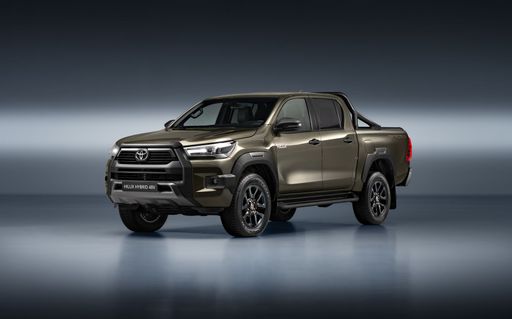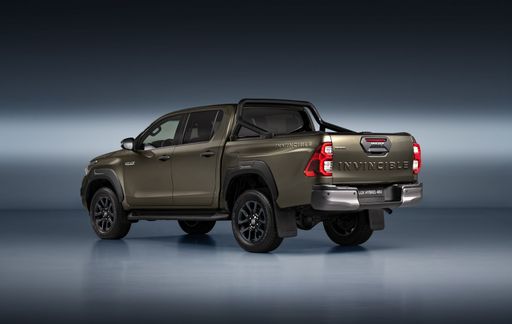Toyota Hilux VS Hyundai Kona – Specs, Efficiency & Price Comparison
Which model is the better choice – the Toyota Hilux or the Hyundai Kona? We compare performance (204 HP vs 218 HP), boot capacity ( vs 466 L), efficiency (9.70 L vs 14.60 kWh4.50 L), and of course, the price (39800 £ vs 23100 £).
Find out now which car fits your needs better!
The Toyota Hilux (Pickup) is powered by a Diesel MHEV or Diesel engine and comes with a Automatic or Manuel transmission. In comparison, the Hyundai Kona (SUV) features a Petrol, Full Hybrid or Electric engine and a Manuel or Automatic gearbox.
When it comes to boot capacity, the Toyota Hilux offers , while the Hyundai Kona provides 466 L – depending on what matters most to you. If you’re looking for more power, you’ll need to decide whether the 204 HP of the Toyota Hilux or the 218 HP of the Hyundai Kona suits your needs better.
There are also differences in efficiency: 9.70 L vs 14.60 kWh4.50 L. In terms of price, the Toyota Hilux starts at 39800 £, while the Hyundai Kona is available from 23100 £.
Compare all the key specs now and find out which model fits your lifestyle best!
Toyota Hilux
The Toyota Hilux has long been celebrated for its remarkable durability and reliability, making it a favourite among those needing a robust vehicle for rugged terrains. Known for its unyielding performance, the Hilux combines practicality with a surprisingly comfortable driving experience, both on and off the road. With its distinctive design and advanced safety features, it continues to be a versatile choice for adventurers and professionals alike.
details @ toyota-media.de
@ toyota-media.de
 @ toyota-media.de
@ toyota-media.de
Hyundai Kona
The Hyundai Kona blends a bold design with a versatile interior, making it a standout choice in the compact SUV market. Its crisp handling and responsive steering provide an engaging driving experience, whether in the city or on the open road. The vehicle also offers a range of features designed to enhance comfort and connectivity, ensuring a pleasurable journey for both driver and passengers.
details @ hyundai.news
@ hyundai.news
 @ hyundai.news
@ hyundai.news
 @ hyundai.news
@ hyundai.news
 @ hyundai.news
@ hyundai.news

|

|
|
|
|
Costs and Consumption |
|
|---|---|
|
Price
39800 - 56200 £
|
Price
23100 - 41600 £
|
|
Consumption L/100km
9.7 - 10 L
|
Consumption L/100km
4.5 - 6.9 L
|
|
Consumption kWh/100km
-
|
Consumption kWh/100km
14.6 - 16.8 kWh
|
|
Electric Range
-
|
Electric Range
377 - 514 km
|
|
Battery Capacity
-
|
Battery Capacity
1.3 - 65.4 kWh
|
|
co2
253 - 264 g/km
|
co2
0 - 157 g/km
|
|
Fuel tank capacity
80 L
|
Fuel tank capacity
38 - 47 L
|
Dimensions and Body |
|
|---|---|
|
Body Type
Pickup
|
Body Type
SUV
|
|
Seats
4 - 5
|
Seats
5
|
|
Doors
2 - 4
|
Doors
5
|
|
Curb weight
2085 - 2155 kg
|
Curb weight
1370 - 1773 kg
|
|
Trunk capacity
-
|
Trunk capacity
466 L
|
|
Length
5325 mm
|
Length
4350 - 4385 mm
|
|
Width
1855 mm
|
Width
1825 mm
|
|
Height
1810 - 1815 mm
|
Height
1580 - 1585 mm
|
|
Payload
1040 - 1125 kg
|
Payload
420 - 490 kg
|
Engine and Performance |
|
|---|---|
|
Engine Type
Diesel MHEV, Diesel
|
Engine Type
Petrol, Full Hybrid, Electric
|
|
Transmission
Automatic, Manuel
|
Transmission
Manuel, Automatic
|
|
Transmission Detail
Automatikgetriebe, Schaltgetriebe
|
Transmission Detail
Schaltgetriebe, Automat. Schaltgetriebe (Doppelkupplung)
|
|
Drive Type
All-Wheel Drive
|
Drive Type
Front-Wheel Drive, All-Wheel Drive
|
|
Power HP
150 - 204 HP
|
Power HP
100 - 218 HP
|
|
Acceleration 0-100km/h
10.70 s
|
Acceleration 0-100km/h
7.8 - 13.3 s
|
|
Max Speed
170 - 175 km/h
|
Max Speed
162 - 208 km/h
|
|
Torque
400 - 500 Nm
|
Torque
200 - 265 Nm
|
|
Number of Cylinders
4
|
Number of Cylinders
3 - 4
|
|
Power kW
110 - 150 kW
|
Power kW
74 - 160 kW
|
|
Engine capacity
2393 - 2755 cm3
|
Engine capacity
998 - 1598 cm3
|
General |
|
|---|---|
|
Model Year
2024 - 2025
|
Model Year
2024
|
|
CO2 Efficiency Class
G
|
CO2 Efficiency Class
D, C, E, F, A
|
|
Brand
Toyota
|
Brand
Hyundai
|
Toyota Hilux
Discover the Iconic Toyota Hilux: A Blend of Robustness and Innovation
The Toyota Hilux is a name synonymous with durability and reliability, making it a favourite in the pick-up market. But beyond its rugged exterior, the Hilux offers a multitude of technological advancements and engineering marvels that are worthy of exploration. In this article, we'll delve into the details that make the Toyota Hilux a remarkable vehicle in its class.
Engineering Excellence: Under the Hood of the Hilux
The Toyota Hilux is powered by a 2.4-litre D-4D diesel engine, delivering a robust 150 PS and a torque of 400 Nm. This engine configuration ensures that the Hilux maintains impressive pulling power and performance, be it on or off the road. The vehicle is equipped with an automatic 4x4 transmission, which enhances its off-road capabilities while ensuring a smooth ride on urban pavements.
Despite its powerful performance, the Hilux is relatively efficient for a vehicle of its size, offering a consumption rate of 8.7 L/100km. The 80-litre fuel tank capacity ensures fewer stops on longer journeys, making it a reliable companion for adventure seekers.
Structural Strength and Versatility
What sets the Hilux apart is its build quality. With a length of 5325 mm, width of 1855 mm, and height of 1815 mm, the Toyota Hilux embodies a commanding presence. It is designed to handle a payload of up to 1025 kg, making it a perfect choice for those requiring a tough utility vehicle without compromising on comfort and style. Moreover, its 5-seat capacity ensures that it's as comfortable for passengers as it is practical for cargo.
Innovative Features for Enhanced Comfort and Safety
The Toyota Hilux is equipped with a plethora of features aimed at enhancing driver and passenger comfort and safety. Its "Comfort 4x4 Automatik" line includes modern technological integrations, such as advanced infotainment systems and driver assistance features. This line of improvements ensures that every journey in the Hilux is as pleasurable as it is safe.
In terms of safety standards, the Hilux does not compromise. It comes packed with a range of driver assistance systems, ensuring a secure drive in both urban and off-road environments. Though it scores a CO2 efficiency class of G, plans for future iterations of the Hilux aim to incorporate more eco-friendly technologies.
Conclusion: The Toyota Hilux Legacy
The Toyota Hilux continues to be a cornerstone in the pick-up truck market, offering reliability, power, and innovation. With its blend of engineering excellence, versatile design, and cutting-edge features, the Hilux stands its ground as a leader in its category. Whether you are navigating city streets or exploring the wild, the Toyota Hilux is engineered to handle it all with grace and strength.
Hyundai Kona
The Hyundai Kona: A Comprehensive Overview
The Hyundai Kona has established itself as a standout in the compact SUV segment, blending innovation with performance and style. As the automotive world moves towards more sustainable and efficient options, the Kona offers a variety of powertrains, from traditional petrol engines to full hybrids and all-electric models.
Powertrain Options and Performance
The Hyundai Kona's powertrain choices cater to a wide range of preferences. For petrol enthusiasts, the Kona offers a 1.0L T-GDI engine, delivering 100 PS, and a more robust 1.6L T-GDI variant with up to 170 PS. Those looking for efficiency without sacrificing power can consider the full hybrid model, offering 129 PS and an impressive consumption of 4.5 L/100km.
For a greener option, the all-electric Kona provides a compelling case. With battery capacities of up to 65.4 kWh, the electric Kona offers power outputs of 156 to 218 PS, and efficiencies as low as 14.6 kWh/100km, enabling an electric range of up to 513 km.
Technical Specifications and Innovations
Built on a robust platform, the Kona delivers versatility and reliability. With a choice between manual or dual-clutch automatic gearboxes, along with options for front-wheel or all-wheel drive, the Kona ensures a tailored driving experience. The handling is enhanced by the car's lightweight construction, balancing a 1370 to 1773 kg curb weight with dynamic performance.
The Kona's design doesn't compromise cargo space for style; it offers a generous 466 L boot capacity. With a relatively compact body, measuring 4350 to 4385 mm in length, the Kona easily navigates urban environments while still commanding a strong road presence with its 1825 mm width.
Efficiency and Eco-Friendliness
Hyundai is committed to reducing emissions, as evidenced by the Kona's CO2 efficiency ratings, which range from class A for electric models to class D for some higher-performance petrol variants. The focus on reducing environmental impact without sacrificing driving pleasure is notable throughout the Kona range.
Costing and Value
The Hyundai Kona offers commendable value for money. Pricing starts at €26,400 and reaches up to €50,690, depending on the chosen configuration. The monthly running costs range from €956 to €1090, with a cost per kilometre of 38.3 to 43.6 cents, making it a competitive option in its class.
Conclusion: Modern, Efficient, and Versatile
The Hyundai Kona stands as a testament to Hyundai's commitment to innovation, efficiency, and practicality. Whether you are inclined towards a traditional combustion engine, a hybrid for a balance of power and efficiency, or a full electric model for maximum eco-friendliness, the Kona provides a tailored solution for each unique driver preference.
The prices and data displayed are estimates based on German list prices and may vary by country. This information is not legally binding.
